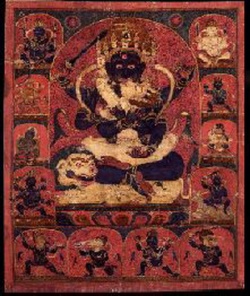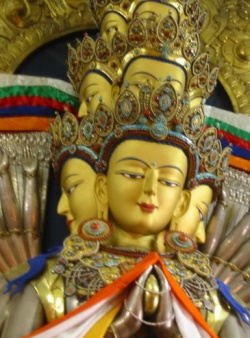Maitreya-nātha
Maitreya-nātha (ca. 270-350 CE) is a name whose use was pioneered by Buddhist scholars Erich Frauwallner, Giuseppe Tucci, and Hakuju Ui to distinguish one of the three founders of the Yogācāra school of Buddhist philosophy, along with Asaṅga and Vasubandhu. Some scholars believe this "Maitreya" to be a historical person in India. The traditions themselves have held that it is referring to the bodhisattva Maitreya.
Academic views
Scholars are divided in opinion whether the name denotes a historical human teacher of Asaṅga or the bodhisattva Maitreya.
Louis de La Vallée Poussin stated that Maitreya-nātha is not the name of a man, but rather "He who is protected by Maitreya". He considers Natha to be a synonym of buddha, or more precisely bhagavat.
Traditional view
The Buddhist traditions themselves have always held that Asaṅga received the texts in question from Bodhisattva Maitreya directly in Tuṣita heaven. Asaṅga is said to have spent many years in intense meditation, during which time tradition says that he often visited Tuṣita Heaven to receive teachings from the bodhisattva Maitreya. Heavens such as Tuṣita Heaven are said to be accessible through meditation. Xuanzang tells the account of these events:
In the great mango grove five or six li to the southwest of the city (Ayodhyā), there is an old monastery where Asaṅga Bodhisattva received instructions and guided the common people. At night he went up to the place of Maitreya Bodhisattva in Tuṣita Heaven to learn the Yogācārabhūmi-śāstra, the Mahāyāna-sūtra-alaṃkāra-śāstra, the Madhyānta-vibhāga-śāstra, etc.; in the daytime, he lectured on the marvelous principles to a great audience.
Confusion over the idea of "supernaturally" visiting heavens may be due to the unfamiliarity of scholars with the Indian concept of heavens as being accessible through samādhi. Other advanced meditators recorded similar experiences of visiting Tuṣita Heaven at night. One such example of this is Hanshan Deqing during the Ming Dynasty. In his autobiography, Hanshan describes the palace of Maitreya in Tuṣita, and hearing a lecture given by Bodhisattva Maitreya to a large group of his disciples.
In a moment I saw that tall, dignified monks were standing in line before the throne. Suddenly, a bhikṣu, holding a sutra in his hands, came down from behind the throne and handed the sutra to me, saying, "Master is going to talk about this sutra. He asked me to give it to you." I received it with joy but when I opened it I saw that it was written in gold Sanskrit letters which I could not read. I put it inside my robe and asked, "Who is the Master?" The bhiksu replied, "Maitreya."
Hanshan Deqing recalls the teaching given as the following:
Maitreya said, "Discrimination is consciousness. Nondiscrimination is wisdom. Clinging to consciousness will bring disgrace but clinging to wisdom will bring purity. Disgrace leads to birth and death but purity leads to Nirvana." I listened to him as if I were in a dream within the dream. His voice, like the sound of tinkling crystal, floated on the air. I could hear him so clearly that even when I awoke his words kept on repeating in my mind. Now I realized the difference between consciousness and wisdom. Now I realized also that the place where I had been in my dream was Maitreya Buddha's Chamber in Tushita Heaven.
Attributed works
The number of works attributed to him vary in the traditions of Tibetan Buddhism and Chinese Buddhism, but variously include:
the Yogācāra-bhūmi-śāstra
the Mahāyāna-sūtrālamkāra-kārikā
the Dharma-dharmatā-vibhāga
the Madhyānta-vibhāga-kārikā
the Abhisamaya-alamkāra
the Ratna-gotra-vibhaga, also known as the Uttaratantrashastra
The last five works are often referred to, collectively as the Five Dharmas of Maitreya, and their authorship is given variously to Maitreyanatha, Asaṅga or a combination thereof.

